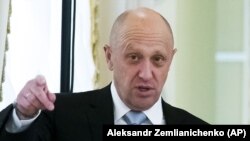On Oct. 13, the Russian state news agency TASS published a story headlined: “Entrepreneur files lawsuits against Navalny and his supporters.”
The “entrepreneur” in question is Yevgeny Prigozhin, described as a “Russian businessman and CEO of Concord company.” The story goes on to state that Concord’s press service announced the company was filing lawsuits for “protection of honor and dignity” against recently poisoned Russian opposition activist Alexey Navalny and several other opposition activists and politicians.
TASS further quotes Concord’s press service as claiming the purpose of the lawsuit for “publication of insulting remarks towards the business, containing libel.”
Not mentioned anywhere in the article are details about Yevgeny Prigozhin’s ties to Russian President Vladimir Putin or Concord’s business.
That makes the story and headline misleading.
These days, Prigozhin is well-known as “Putin’s Chef” for his involvement in the restaurant and catering business and his close ties to the Russian president. But before he started operating restaurants in St. Petersburg in the 1990’s, Prigozhin served nine years in prison for involvement in a criminal organization. Specific charges included robbery, fraud and involving minors in prostitution.
Prigozhin crossed paths with Putin in 2001, when he hosted a meeting between the Russian president and French President Jacques Chirac at his elite St. Petersburg restaurant, New Island.
He made inroads into the halls of Russian power, securing lucrative contracts with the government and in particular, the Ministry of Defense. After 2016, however, the world came to know Prigozhin for two particular business ventures, neither of which were connected with the food service industry.
After the 2016 U.S. presidential election, the special investigation led by Special Counsel Robert Muller concluded that “the Russian government interfered in the 2016 presidential election in sweeping and systematic fashion.”
Although a major part of this investigation focused on the cyberattack against the Democratic National Committee, another key aspect was the role of the St. Petersburg-based Internet Research Agency, better known as the “Troll Factory,” which sought to influence American voters via social media using fake accounts. The agency was found to be owned by Concord Management, Prigozhin’s company.
In 2018, the U.S. Justice Department indicted Prigozhin, Concord Management and Consulting, Concord Catering, the Internet Research Agency, and twelve other Russian nationals in connection with the case.
Concord tried to contest the charges, and in 2020 the Justice Department dropped the indictments against the two companies. DOJ officials and prosecutors claimed that Concord was attempting to use the discovery process to obtain access to documents that would shed light on the U.S. authorities’ investigation methodology, and that the defendants were using what information they had obtained to mount a disinformation campaign. The other defendants in the indictment remained.
Prigozhin himself was first hit with U.S. sanctions in 2016 for his connections to the Russian government and support for Russian operations in Ukraine. The latter involved the 2014 annexation of the Crimean peninsula and the invasion and creation of puppet statelets in Ukraine’s eastern Donbas region that same year.
Additional sanctions were added in 2017 and 2018, the latter in connection with Prigozhin’s other business venture, a private military company known as “PMC Wagner,” which has sent mercenaries to fight in Ukraine, Syria, Libya, and the Central African Republic.
This year, the U.S. Treasury Department again sanctioned Prigozhin in connection with Russia’s 2016 election interference.
“Yevgeniy Prigozhin has an international network of supporters to spread his malign political and economic influence around the globe,” said U.S Treasury Secretary Steven Mnuchin.“The United States will continue to target the ability of Prigozhin to conduct operations globally.”
The U.S. Treasury Department identified Prigozhin as the “leader and financier of the Internet Research Agency (IRA), the Russian troll farm that was first designated by OFAC (Office of Foreign Assets Control) in 2018.”
Prigozhin has denied these allegations against him, and claimed that he has no connection to PMC Wagner despite evidence of links to the mercenary outfit and its leader, Dmitry Utkin. The Kremlin has also spoken up on behalf of Prigozhin on the topic of sanctions.
The TASS article did not include any of this information about Prigozhin’s past, his connections to the Kremlin, his involvement in mass disinformation operations and mercenary activities, or the sanctions against him.
Navalny, a journalist and political activist, is considered one of the government's and Putin's sharpest critics. His poisoning in August became an international incident. Navalny was taken for treatment to Berlin, and multiple tests indicated he was exposed to a Soviet-era nerve agent, likely during his return from a political trip to Siberia.





